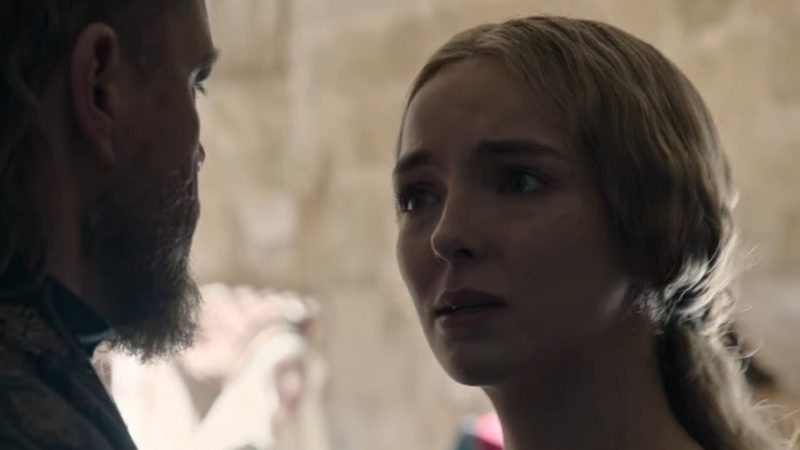
Everyone has their own version of how the events in their daily lives play out. This is a natural part of the human experience, but one that has become even more prevalent in the social media age with many people thinking of themselves as the main character within the world they inhabit. This can cause a myriad of issues, particularly when it intersects with other problems our society historically faces. A new film from legendary Ridley Scott transports us back in time to analyze this phenomenon.
The Last Duel is based on a 2004 book and set in medieval France. In it, we meet Jean de Carrouges (Matt Damon), a knight known for his bravery and skill on the battlefield, but with a prickly attitude and poor relationship with Count Pierre d’Alençon (Ben Affleck). His friend Jacques Le Gris (Adam Driver) on the other hand is a squire with a reputation as a ladies man. His intelligence makes him one of the most admired nobles in court and a close friend of the Count. After Jacques sexually assaults Jean’s wife Marguerite (Jodie Comer), she reports the attack and while brave, it also puts her at odds with French society and her husband, who is enraged at both her and Jacques. Jean soon requests a trial by combat with Marguerite at risk for being burned at the stake should he lose.
Scott’s decision to structure The Last Duel’s similarly to the 1950 classic film Rashomon where the story is shown three separate times through each characters’ eyes feels like an ingenious choice not just because this style so accurately depicts how individuals interpret what truth is through their own lens, but also because telling the story from the vantage point of each character strengthens its theme, the characterization of the main players, and provides additional weight to the truth of what happened. When we see the story through the eyes of both Jean and Jacques, it drives home the point that each man’s ego and self-absorption causes them to see themselves as the hero in the scenario despite the nature of their behavior and how they interact with those around them. It is apt commentary on main character syndrome and the tendency of people to paint themselves in the best possible light at all times. Both men genuinely believe themselves to be virtuous and innocent, despite there being evidence to the contrary and persons that witness their bad behavior.
What is true in the story is that Marguerite finds herself stuck in-between the entitlement and lack of self-control of two men and is unable to navigate them safely due to the social conventions of the time. Both Jean and Jacques treat Marguerite as property with her treatment being reflective of their own standing in the world, whether it be an affront or a boon to their image. The strongest example of this is Jean’s reaction to Marguerite’s reveal of her rape where he complained about what the vicious act meant in terms of Jacques’ treatment of him rather than its direct effect on her. It is sure to be an accurate but painful reminder for many female audience members of how women are often viewed and treated in society and by the men in their lives. The French justice system of the time offers Marguerite little protection either, casting doubt and aspersions on both her story and her character. Marguerite is the target not just of the court system, but her own female friends turn on her and testify to her “flirtation” with Jacques and previous comments on his attractiveness, another aspect of her ordeal that feels all too real. In one poignant scene, Jean’s mother confronts Marguerite, urging her to realize the folly of fighting rape in their society and revealing her own sexual assault as a young woman. In Jean’s mother’s eyes, sexual assault is just the risk of womanhood and if it happens, power through a soldier on. In the exchange, we see a glimpse of our own history regarding this conversation. All of this combines to make the film’s third act climax all the more cruel that Marguerite’s fate is left up to a duel between the two men that put her in the predicament in the first place.
Jodie Comer offers a powerful performance as Marguerite, hitting all the right notes in a role that runs the emotional gamut. Marguerite is forced to battle individuals within her sphere as well as societal attitudes writ large and Comer portrays this struggle in a way that is empathetic and piercing. Adam Driver’s performance as the arrogant and entitled Jacques is equally impactful, but in the opposite and more detestable way. Driver not only makes Jacques’ bad behavior palpable, but also his genuine belief that all of his actions were justified and innocent, despite the reality of the situation. His character’s mindset is integral in driving home the film’s theme and Driver nails it.
The Last Duel is a compelling story that is also thought provoking about the nature of people and the historical treatment of women, particularly in the context of sexual assault. By exploring these questions against the backdrop of medieval France, it drives home the universality of these issues and the human failing in addressing that spans centuries. The structure of the film compliments the subject matter perfectly and also assures that the film is immaculately paced and never really drags or becomes monotonous. The ensemble cast rounds out all the good things about the film, making this a film worthy of your time.

